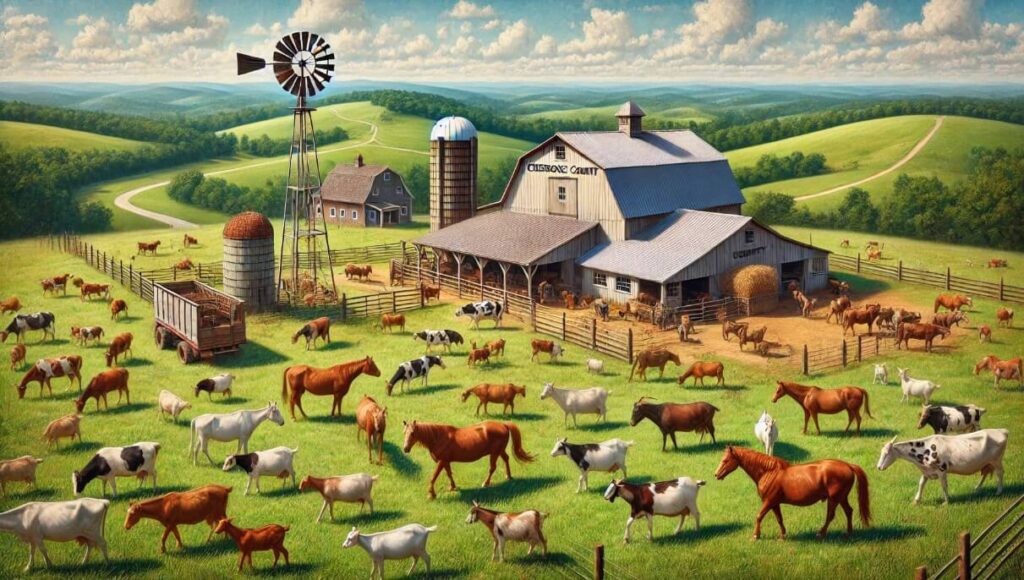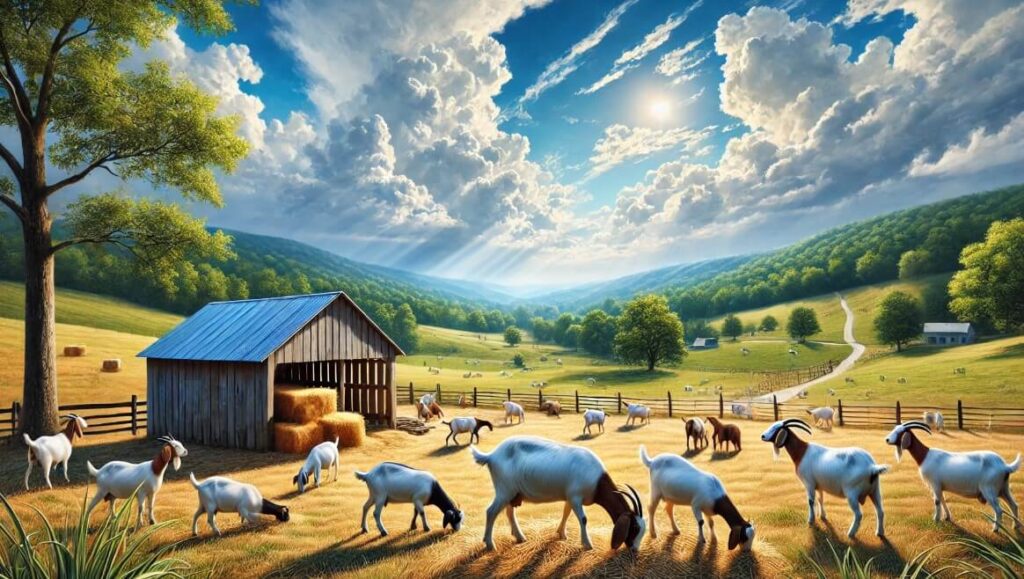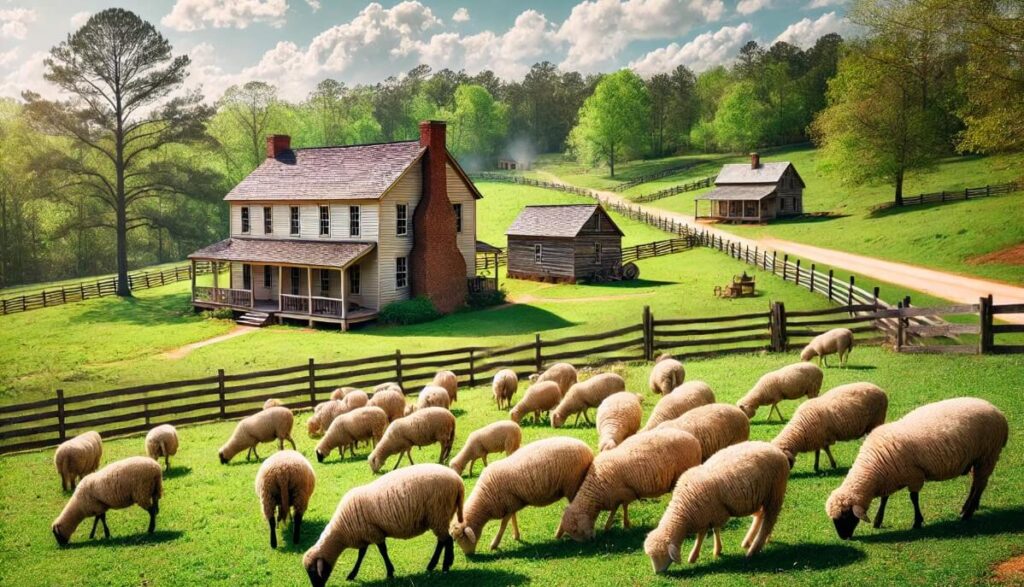In the context of Georgia’s Cherokee County, livestock has played a very big role in the agricultural sector, economy, and society at large. This article seeks to delve into the most significant livestock species in the county, their significance, and how they impact the agricultural culture of Cherokee County.
Overview of Livestock in Cherokee County
Cherokee County situated among the hills in northern Georgia has a background in farming and animal production. Due to its moderately warm climate and fertile soils this county is able to raise and farm different species of animals which adds value to and enhances the local economy and agriculture. The most common species of livestock consist of cattle, poultry, horses, goats, sheep.
Leading Livestock Species in Cherokee County, GA

1. Cattle and Calves: The Dominant Species
The leading livestock type in Cherokee County is cattle. In over 2,700 of dairy and beef production, they are in the forefront and continue to report significant growth. Native farmers tend to put high premium on the breeding and sustainable grazing causing the area to be well known in the area with top quality beef and milk.
Cherokee County’s cattle farming exhibits the livestock’s significance to the state more so because beef remains one of the dominant industries in Georgia.
2. Poultry: The Powerhouse of Agricultural Sales
Those who indulge in poultry businesses, cherokee county alongside with its rich agricultural background specializes in the cherokee county egg layer production. Layering chickens aids them in the growing economy of cherokees. Chicken meat and eggs are in high demand compared to any other type of food, Chicken farming has the highest market worth.
3. Horses and Ponies: A Cherished Livestock
Cherokee county has approximately 1775 ponies and horses and they form a significant part of the cherokee economy. Apart from being part of the livestock, ponies and horses are used for recreational activities as well . The cherokees hold a deep respect and admiration for horses because of their vast utilizations, starting from farmlands to various sports.
4. Goats: A Growing Industry

Around 487 goats have been reported in cherokee country and the number keeps on increasing. Goat farming is gaining traction, especially regarding goat farming for meat and milk. Goat milk is extensively used for cheese production and doing so allows other local markets to supply organically produced and locally sourced goods as well.
5. Sheep and Lambs: A Small but Significant Population

Sheep and Lambs all together have had a total of 82 reported to yield, which is comparatively low however all these animals aid in the niche markets for wool and lamb meat. Sheep ranching assists in the mix of agriculture in the county and helps in the practice of land management via grazing.
Factors Influencing Livestock Dominance
Climate and Geography
Cherokee County’s temperate climate and diverse topography provide an ideal environment for livestock farming. Rolling pastures and access to water sources support healthy grazing and farming practices.
Agricultural Innovation
Farmers in Cherokee County embrace modern techniques, from rotational grazing for cattle to advanced poultry housing systems. These innovations ensure productivity while maintaining sustainability.
Community and Economic Impact
Mostly, livestock farming actively contributes to the job market by creating new job opportunities while promoting tourism within the county, There is a preservation of the agricultural traditions that exist within the county region. Farming activities, such as horse races and farm tours, strongly showcase the cultural significance of agriculture in the Cherokee County region.
Livestock Numbers in Cherokee County, GA
| Livestock Species | Estimated Numbers | Primary Use |
|---|---|---|
| Cattle and Calves | 2,769 | Beef and dairy production |
| Horses and Ponies | 1,775 | Recreation and work |
| Poultry (Layers) | 876 | Egg production |
| Goats | 487 | Meat and milk production |
| Sheep and Lambs | 82 | Wool and meat production |
| Hogs and Pigs | 49 | Meat production |
The Economic Impact of Livestock Farming
The economy of Cherokee County has a strong reliance on livestock farming, as a significant part of their agricultural income comes from it. In terms of revenue generation chicken, poultry, and eggs always rank the highest, while cattle follow as the second most purchased animal. The livestock industry has a strong role in assisting the community with meeting the local demand alongside the regional and even national demands.
Challenges in Livestock Farming
Land Use Pressure
As urbanization increases in Cherokee County, farmers face challenges in retaining grazing land for livestock.
Climate Variability
Shifting weather patterns impact forage availability and animal health, necessitating adaptive farming practices.
Market Fluctuations
Fluctuating prices for meats, dairy, and eggs may not guarantee the farmers profits.
Conclusion
Cattle are the most abundant livestock species and poultry and horses follow, but they do more than populate the farmland, they also demonstrate the ardour of the farmers to transform the county’s agricultural sector. Building on the good fortunes of technology and pledging to maintain the culture of agriculture, Cherokee County is still on the map when it comes to livestock farming.
FAQs
1. What is the primary livestock species in Cherokee County?
Cattle remains at the forefront, given that in the latest census cattle reporting exceeded 2700 heads.
2. Why is poultry farming significant in Cherokee County?
Poultry farming is significant due to its high market value and contribution to meat and egg production.
3. How does Cherokee County support livestock farming?
Cherokee County has access to farm inputs, generally good weather conditions and good arable land hence supporting livestock farming.
4. What challenges do livestock farmers face in Cherokee County?
Farmers face challenges like land use pressure, climate variability, and market fluctuations.
5. How does livestock farming impact Cherokee County’s economy?
Livestock farming drives the local economy through job creation, market sales, and tourism, preserving the county’s agricultural identity.


